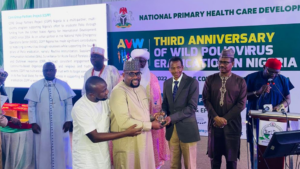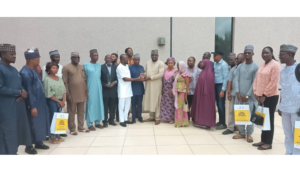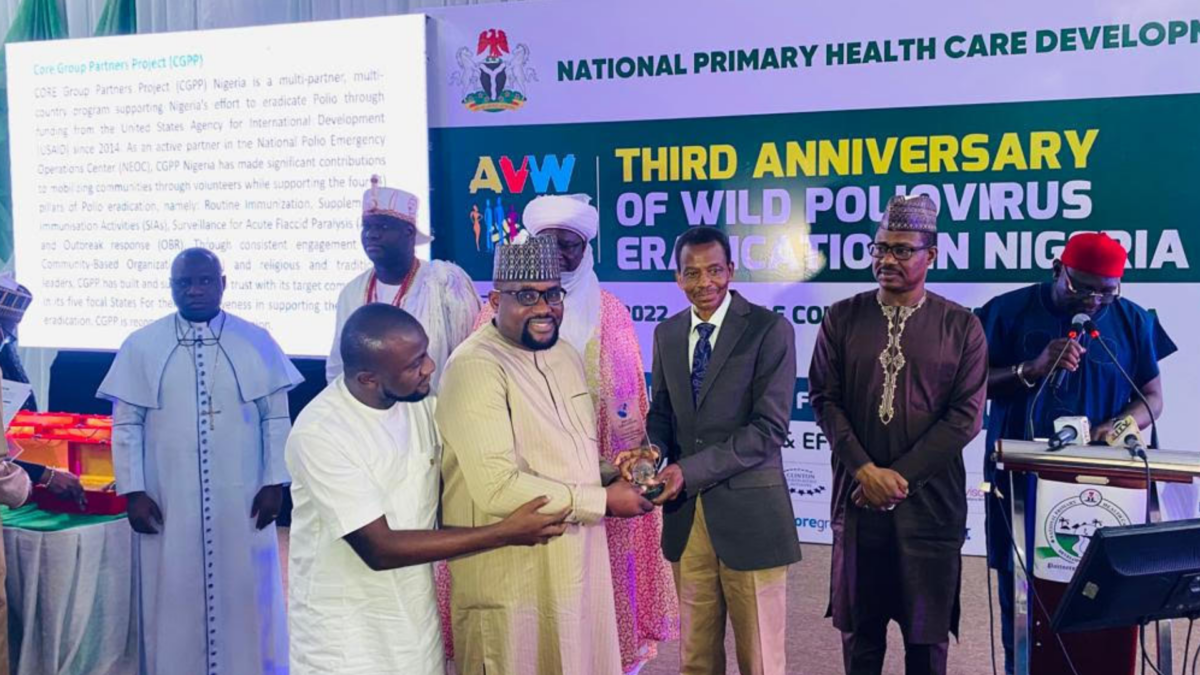
 KADO-ABUJA, NIGERIA — Two years ago on August 25, 2020, Nigeria and Africa were certified as free from the Wild Polio Virus Type 1 that has been responsible for paralysis in thousands of children across the world before the advent of the Global Polio Eradication Initiative (GPEI) in 1988. Nigeria is the last African country to be declared free from the wild virus. And yet there is still much work to be done to reach polio eradication. Recently that continued work was recognized by the Federal Ministry of Health and the National Primary Health Care Development Authority in Nigeria through its Polio Heroes Award given to CORE Group Partners Project (CGPP) Nigeria.
KADO-ABUJA, NIGERIA — Two years ago on August 25, 2020, Nigeria and Africa were certified as free from the Wild Polio Virus Type 1 that has been responsible for paralysis in thousands of children across the world before the advent of the Global Polio Eradication Initiative (GPEI) in 1988. Nigeria is the last African country to be declared free from the wild virus. And yet there is still much work to be done to reach polio eradication. Recently that continued work was recognized by the Federal Ministry of Health and the National Primary Health Care Development Authority in Nigeria through its Polio Heroes Award given to CORE Group Partners Project (CGPP) Nigeria.
The USAID funded CGPP works in five states in Nigeria through six community-based organizations — Archdiocesan Catholic Healthcare Initiative, Community Support and Development Initiative, Family Health and Youth Empowerment, Federation of Muslim Women Association of Nigeria, WAKA Rural Development Initiative, and Royal Heritage Healthcare Foundation — supported by three international NGOs — Catholic Relief Services, International Medical Corps, and Save the Children. World Vision US serves as the prime recipient of the grant and coordinates the global program. On August 25, 2022, The CGPP Nigeria Secretariat with members representing four of the organizations involved accepted the 2022 Polio Heroes Award at the Nigerian Air Force Conference Centre and Suites in Kado-Abuja, Nigeria.
“Overall, in Nigeria, the general feeling is that of elation, accomplishment, and reward,” said Dr. Samuel Usman, who has been serving as the Secretariat Director of CGPP Nigeria since its inception in 2013. “It’s gratifying to see Nigeria free of wild polio. The overall feeling is that this huge work requiring huge resources has culminated in being declared free of the wild polio virus,” he said. “This is a testament to the hard work and dedication of all of our team. The volunteer community mobilizers who go house-to-house before, during, and after supplementary immunization activities and outbreaks to raise awareness and dispel rumors and misconceptions that hinder acceptance of the Oral Polio Vaccine (OPV) are the real heroes of this all,” he said.
Even so, it is a sobering reminder that the rewards of this work come at a heavy cost. Nearly ten years ago, nine polio workers were shot and killed in Nigeria, due to misleading rumors. “I also salute those who also lost their lives during the course of this ongoing battle against polio. May their souls rest in peace,” Usman said. Security is taken very seriously with this work.
Presently religious leaders led by his Eminence the Sultan of Sokoto, Alhaji Sa’ad Abubakar III, have been integral in changing the attitude toward immunizations and vaccinations. Usman said that sometimes, prominent leaders will publicly take the vaccine drop in their mouth to show the community that the drops are safe. CGPP Nigeria utilizes a communication model that “emphasizes the need to counter suspicion and address myths and misunderstandings by convening community dialogs and compound meetings, both of which serve as safe spaces for open discussion primarily aimed at addressing non-compliance. In the communities in Kaduna, Katsina, Kano, Borno, and Yobe states located in the CGPP implementation areas, there has been a consistent reduction in the number of missed children and consistent improvement in polio immunization uptake, providing evidence of the effectiveness of the CGPP communication model.” See more from The CORE Group Partners Project in North East Nigeria: Community Engagement Strategies to Combat Skepticism and Build Trust for Vaccine Acceptance.
“I want to thank World Vision, Save The Children, Catholic Relief Services, and International Medical Corps for the collaboration and partnership that made this award possible. I also want to commend all the team leads, the state team leads and other program staff in the secretariat and across the five focal states for their tireless work to ensure each eligible child is vaccinated,” Usman said. United States Agency for International Development (USAID) has supported polio eradication efforts through CGPP in Nigeria since 2013 and around the world since 1999. “We can never thank them enough for their support, guidance, and funding without which we would not be able to do what we do,” Usman said. “With their support, we are able to make a difference in very difficult and challenging areas where others avoid. A special thanks to Ellyn Ogden for believing in us and advocating for us always.”
CGPP Nigeria contributes to polio eradication by increasing population immunity and enhancing surveillance for Acute Flaccid Paralysis (AFP). The secretariat coordinates and supervises program activities in challenging, hard-to-reach, and insecure areas of northern Nigeria. It plays an essential role in promoting civil society’s expertise in Nigeria’s polio eradication efforts through community-level promotion of immunization, case detection, surveillance, and outbreak response. This work is done through more than 1,000 active female community volunteers who raise awareness and reduce misinformation, non-compliance, and vaccine rejection.
Outbreaks of Circulating Variant Poliovirus Type 2 (cVDPV2) happen because of low immunization coverage in certain areas due to vaccine resistance and access challenges. “General skepticism around vaccines increases when people are told that a polio outbreak is caused by the vaccine itself,” said Usman in a Devex article.
Usman said that this award shows that CGPP’s Secretariat Model really works, and yet the work must go on. “We all must continue to put in our best to ensure each child is vaccinated, and that we track every eligible child to ensure they get OPV and IPV thereby increasing coverage in our focal settlements, Wards, local government areas, and states,” he said. “This way, we will continue to interrupt the ongoing outbreak of cVDPV2.”

